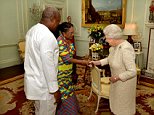Google teams up with Oxford academics to bring human-like robots closer to reality
- Google has teamed up with two of Oxford’s artificial intelligence (AI) teams
- The first will lead research into helping machines better understand users
- The second is tasked with improving visual recognition using deep learning
- Google bought AI firm Deep Mind in January, designed to help computers think like humans
- Tech giant is also working on quantum chips based on the human brain
Google has further demonstrated just how serious it is about making computers think like humans.
The California tech giant has teamed up with two of Oxford University’s artificial intelligence (AI) teams to help machines better understand users, and improve visual recognition systems using deep learning.
This partnership follows reports Google is also developing superfast ‘quantum’ chips modelled on the human brain, to make searches and software more intuitive.
Google has teamed up with two of Oxford University’s (pictured) artificial intelligence (AI) teams. The first will lead research into helping machines better understand users, while the second has been tasked to improve visual recognition systems using deep learning
‘It is a really exciting time for AI research these days, and progress is being made on many fronts including image recognition and natural language understanding,’ wrote Demis Hassabis, co-founder of DeepMind and vice president of engineering at Google in a blog post.
‘We are delighted to announce a partnership with Oxford University to accelerate Google’s research efforts in these areas.’
Google DeepMind will be working with two of Oxford’s AI research teams.
Professor Nando de Freitas, Professor Phil Blunsom, Dr Edward Grefenstette and Dr Karl Moritz Hermann, who teamed up earlier this year to co-found Dark Blue Labs, will be leading research to help machines better understand what users are saying to them.
Also joining the DeepMind team will be Dr Karen Simonyan, Max Jaderberg and Professor Andrew Zisserman, experts in computer vision systems.
As co-founders of Vision Factory, their aim is to improve visual recognition systems using deep learning.
Dr Simonyan and Professor Zisserman developed one of the winning systems at the recent 2014 ImageNet competition.
Google DeepMind has hired all seven founders of these startups with the three professors holding joint appointments at Oxford University where they will continue to spend part of their time.
‘These exciting partnerships underline how committed Google DeepMind is to supporting the development of UK academia and the growth of strong scientific research labs,’ continued Mr Hassabis.
As a part of the collaboration, Google DeepMind will be donating to establish a research partnership with the Computer Science Department and the Engineering Department at Oxford University.
‘We are thrilled to welcome these extremely talented machine learning researchers to the Google DeepMind team and are excited about the potential impact of the advances their research will bring,’ concluded Mr Hassabis.
Google is also reportedly working on a super-fast 'quantum' computer chip as part its vision to one day have machines think like humans.

Dr Karen Simonyan, Max Jaderberg and Professor Andrew Zisserman are among the experts partnering with Google. Dr Simonyan and Professor Zisserman developed one of the winning systems at the 2014 ImageNet competition. Google's winning entry, which helps computers distinguish between individual objects, is pictured

Google is also reportedly working on a super-fast 'quantum' computer chip as part its vision to one day have machines think like humans. The California-based group has teamed up with leading physicist John Martinis to build processors based on quantum theories, that would potentially work in a similar way to the human brain
The California-based group has teamed up with leading physicist John Martinis to build processors based on quantum theories.

Google acquired artificial intelligence firm DeepMind in January
The new hire is part of a 'hardware initiative' to design and build chips operating on sub-atomic levels in ways that makes them much faster than existing processors.
Standard computers deal with binary data expressed in zeroes and ones. However, quantum computing uses the behaviour of sub-atomic particles to encode data.
Experts believe that a quantum bit, which can have two states at the same time, may be able hugely improve the speed and power of computing.
Professor Martinis currently works at University of California, Santa Barbara, and is one of the most prolific researchers in the area of artificial intelligence.
But Google is also aware of the dangers involved with AI and machine learning.
So much so that in January it set up an ethics board to oversee its work in these fields.
The ethics board is to ensure the projects are not abused.
The DeepMind-Google ethics board is set to create a series of rules and restrictions over the use of the technology.
-
 ISIS lead Syrian woman to her stoning over alleged adultery
ISIS lead Syrian woman to her stoning over alleged adultery
-
 Special delivery: Man punched after slapping guy with pizza
Special delivery: Man punched after slapping guy with pizza
-
 This old man still packs a punch as he knocks out...
This old man still packs a punch as he knocks out...
-
 Heroic Sergeant-at-Arms Kevin Vickers moments after shooting
Heroic Sergeant-at-Arms Kevin Vickers moments after shooting
-
 Sergeant-at-Arms receives hero's welcome in parliament
Sergeant-at-Arms receives hero's welcome in parliament
-
 Dashcam footage shows man thought to be Ottawa shooter
Dashcam footage shows man thought to be Ottawa shooter
-
 UFO spotted above astronaut as he repairs ISS
UFO spotted above astronaut as he repairs ISS
-
 Gunshots ring out inside Canadian Parliament
Gunshots ring out inside Canadian Parliament
-
 Fox News host tells young women: don't vote, go back to...
Fox News host tells young women: don't vote, go back to...
-
 San Franciscan tour guide's explosive racist tirade on...
San Franciscan tour guide's explosive racist tirade on...
-
 AMAZING aerial golf balance trick shot involving three men
AMAZING aerial golf balance trick shot involving three men
-
 It has happened before: Intruder jumps fence at White House
It has happened before: Intruder jumps fence at White House
-
Gym teacher, 24, busted for having sex with 16-year-old...
-
Pictured: Soldier, 24, shot dead by Muslim convert Michael...
-
 Revealed: Muslim convert who shot dead Canadian soldier is...
Revealed: Muslim convert who shot dead Canadian soldier is...
-
Substitute teacher 'had sex with football player student, 17...
-
 Fox News host and former Victoria's Secret model claims...
Fox News host and former Victoria's Secret model claims...
-
White House fence jumper who was caught on video streaking...
-
 'Thanks Michelle Obama for the filling lunch': Student...
'Thanks Michelle Obama for the filling lunch': Student...
-
 Blooming in black: Kate covers up her growing bump with £595...
Blooming in black: Kate covers up her growing bump with £595...
-
 Comfort eating? Chinese woman, 26, spends an entire WEEK in...
Comfort eating? Chinese woman, 26, spends an entire WEEK in...
-
 Emotional sergeant-at-arms is greeted back to parliament...
Emotional sergeant-at-arms is greeted back to parliament...
-
 'He grabbed me by the hair and hit me in the forehead with...
'He grabbed me by the hair and hit me in the forehead with...
-
ISIS releases sickening video clip showing Syrian woman...






































































 Turn yourself into a COMPUTER MOUSE: Exoskeleton chair uses body movements to control an on-screen pointer
Turn yourself into a COMPUTER MOUSE: Exoskeleton chair uses body movements to control an on-screen pointer